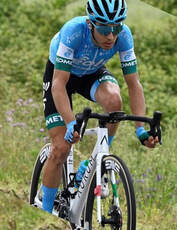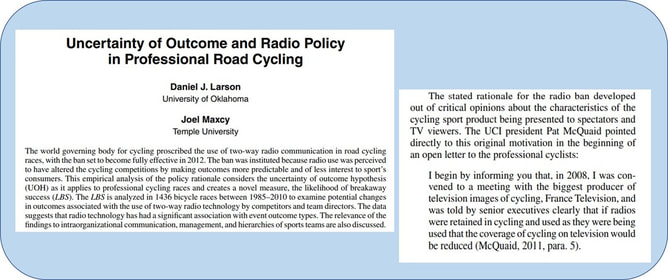McQuaid dominated the administrative side of world cycling in the same way that Kelly dominated the road. McQuaid features in one of the early papers on the economics of cycling. Daniel Larson and Joel Maxcy quoted McQuaid in their 2014 Journal of Sports Management paper (see below). The quotation shows how TV producers can set the agenda for the sport.

Yesterday, as the flag was dropped to start the stage, one rider pretended to attack but slowed within seconds and smiled at the cameras. A few kilometres later, two different riders did something similar. This is where Kelly comes into his own. As the "senior" analyst in the Eurosport stable, he has seen and done so much. With 187km to go in the stage, the cameras showed one of the older riders. This was Kelly's opening to explain how the sport had changed over recent decades. He suggested that the older rider would remember the days when nothing would happen for the opening 100km of a stage. A few kilometres later, Kelly suggested that Mauro Vegni (Director of the Giro) would be talking to the smaller teams encouraging them to attack and to form a breakaway. Eurosport's lead commentator, Carlton Kirby, chipped in with an explanation of the importance of breakaways for TV broadcasters and their willingness to pay for content. McQuaid could not have put it better.
Eventually, a rider from a smaller, invited team set off on his own - a team invited to the Giro by Vegni and his colleagues! Kelly bemoaned the decision of the smaller team to sacrifice one of its better riders and possibly the chance for that rider to win a stage later in the race. A sporting chance reduced by economic realities.
That is not to say that there are no economic incentives for attacking and getting into a breakaway. The previous day on Stage 5, Kirby and Kelly explained the monetary rewards. Kirby explained how the two riders who formed the breakaway in Stage 1 earned €2,000 for their team. Kelly listed the prize money for some of the intermediates scattered within the race, e.g. the winner gets €500 and second place €400 and so on. This then sparked a discussion of the balance between salaries and prize money. You can listen to all this while viewing the Italian countryside. Sport and economics in the glorious Giro.

 RSS Feed
RSS Feed